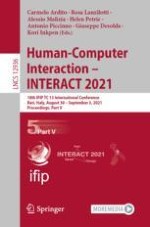
2021 | OriginalPaper | Chapter
Effects of Personal Characteristics on Temporal Response Patterns in Ecological Momentary Assessments
Authors : Tomu Tominaga, Shuhei Yamamoto, Takeshi Kurashima, Hiroyuki Toda
Published in: Human-Computer Interaction – INTERACT 2021
Publisher: Springer International Publishing
Activate our intelligent search to find suitable subject content or patents.
Select sections of text to find matching patents with Artificial Intelligence. powered by
Select sections of text to find additional relevant content using AI-assisted search. powered by